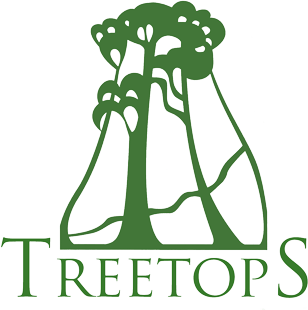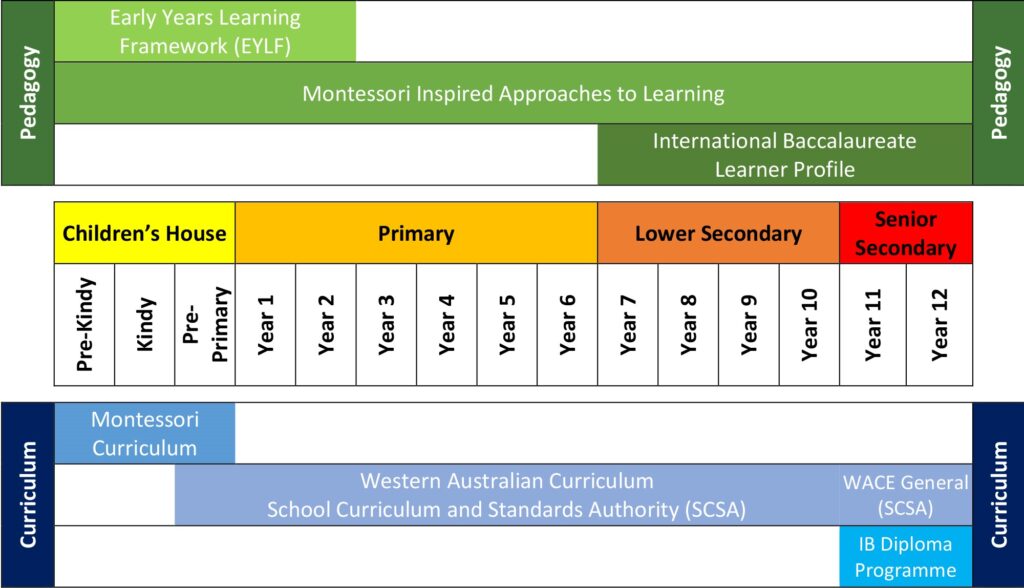WHAT IS THE ‘TREETOPS DIFFERENCE’?
Curriculum and Pedagogy
In meeting our aim to cater for each child’s individual educational needs, Treetops uses a variety of curriculums and pedagogical (learning) approaches.
- Curriculum is what we need to teach to our students
- Pedagogy is the methods and practices that we use to teach them.
Curriculum
Treetops utilises three complementary curricula to facilitate student learning:
- Pre-Kindergarten and Kindergarten students are educated utilising Montessori curriculum;
- Pre-Primary to Year 10 students utilise the SCSA Western Australian curriculum;
- Years 11 and 12 students have the option to study either the:
- SCSA WACE General
- International Baccalaureate Diploma Programme.
FREQUENTLY ASKED QUESTIONS
Is Montessori opposed to competition?
Dr Montessori, herself an extraordinary student and a very high achiever, was never opposed to competition in principle. Her objection was to using competition to create an artificial motivation to get students to achieve. She observed that competition was an ineffective tool to motivate children to learn and work hard in school. Montessori argued that for an education to profoundly touch a child’s heart and mind, the child must be learning because they are curious and interested, not to earn the highest grade in the class.
Traditionally schools challenge students to compete with each other for grades, class rankings, and special awards. Students are constantly measured against their classmates, rather than considered for their individual progress. At Treetops, students learn to collaborate with each other rather than mindlessly compete. Students discover their own innate abilities and develop a strong sense of independence, self-confidence, and self-discipline. In an atmosphere in which children learn at their own pace and compete only against themselves, they learn not to be afraid of making mistakes. They quickly find that few things in life come easily, and they can try again without fear of embarrassment.
How much freedom in the classroom do Treetops students really have?
While the students at Treetops are permitted considerable latitude to pursue topics that interest them, this freedom is conditional and comes with clear responsibilities. Students must be considerate and not disturb the learning of others. Both students and teachers are aware of the work that must be done by each student, covering all areas required in the curriculum. The student is, in fact, not free to do whatever they want but is often free to choose their own sequence from the range of work. Students who have been at Treetops from an early age and whose home environment is compatible with Montessori education, tend to be self-directed in their learning. These students want to learn, and therefore lack of motivation and avoidance is not a problem.
Does Montessori education encourage play as well as work?
Yes! Play is an integral part of learning and students at Treetops have many opportunities each day for creative play. Work and play are not mutually exclusive. Students learn best when they enjoy what they are doing. Often visitors in our classrooms comment on the students’ intense concentration and the earnestness with which they engage in work. However, the students are clearly enjoying their work. To them it is fun, it is joyful, it is rewarding, it is play.
Is it true that Treetops students don’t do homework?
At Treetops, students are assigned homework. Every care is taken to ensure that homework consists of meaningful tasks that expand on the topics that the students are pursuing in class, and is given in carefully measured amounts. Primary students are not expected to spend long periods of time outside school doing academic work. Homework should never become a battleground between adult and child.
By the time students undertake the IB Diploma or WACE General, homework becomes a necessary component of the course. Throughout their learning journey at Treetops, students develop highly effective self managements skills and this is reflected in a mature approach to study both within and outside school. Graduating Treetops students are well prepared for the demands of future study and employment opportunities.
Does Treetops participate in NAPLAN testing?
Treetops complies with NAPLAN testing as part of the government assessment of the system that helps to fund us, but we do not put pressure on our students to perform and we conduct it in as relaxed an atmosphere as possible.
All Treetops students, other than those withdrawn by their parents, sit NAPLAN testing. The subjects covered in NAPLAN are already part of our curriculum and no special classes or lessons are dedicated to the tests’ outcomes. Our teachers use the results to assist in identifying strengths and weaknesses of our numeracy and literacy programs, but we do not consider them as reliable as the ongoing assessments conducted by class teachers throughout the year.
Why small high schools can be a great option.
Choosing a high school can be very stressful for parents as they attempt to find the best fit for their child amongst a daunting array of options. For many children, the move from primary to secondary education can be one of their most challenging periods at school. For some children, a smaller high school, and all its benefits, may be a great alternative option for the transition from primary school or home-schooling to a large and potentially overwhelming secondary school environment.
Small independent schools like Treetops occupy a space that cannot be filled by larger mainstream learning environments – an opportunity for the nurture of young people that will create a foundation for them to flourish.
Our Secondary School has a maximum of approximately sixty students from Years 7 to 12, and our students’ educational journeys are very personal. They know, and are known by, their teachers and enjoy a very collaborative learning environment. Learning experiences are tailored to meet individual need, and interest is facilitated through small class sizes and Montessori-inspired learning approaches – a true ‘no tears and no boredom’ school experience.
Our Secondary students operate with increasing independence and enjoy a level of agency seldom experienced in mainstream schools. The learning environment is ordered, with a strong emphasis upon not being a distraction for the learning of others. Students, in consultation with their teachers, are able to choose the order that they complete various learning tasks, or their component parts. They move more freely in the classroom as, not surprisingly, most people don’t like sitting still for long periods of time.
The materials that our students access are increasingly specialised and can often be quite expensive. Students enjoy access to equipment, and a level of trust in its use, well beyond that of their mainstream school peers and more akin to what would be expected in a workplace.
The Treetops community greatly values pro-social behaviours. Pro-social behaviours are those intended to help other people. These actions are characterised by a concern for the rights, feelings, and welfare of others. Behaviours that can be described as pro-social include feeling empathy and concern for others.
Student feedback reflects that not only do they feel safe at Treetops, but this is an essential component of what they value about their school.
Typical age group social boundaries are not evident at Treetops, as students freely interact with students from all year groups, making friendships based on maturity and interests rather than being limited to age-group peers.
Year 11-12: IBDP or WACE General – which is the right programme for my student?
Student begin to consider their Senior Secondary options during Year 10. Treetops staff will conduct interviews with students and their families in order to determine their final choice of programme and their subject choices. These interviews will consider the needs of the student, their future goals, their current school engagement, plus available school resources.
- Students should undertake the IBDP if they are planning to attend university at the completion of Year 12.
- The WACE General Studies programme is aimed at those students who may have employment or vocational training (TAFE) as their post-schooling goal.
Will Year 11-12 students be able to do the subjects needed for their chosen TAFE or university course?
At Treetops, we have the flexibility to give students many of the same kinds of academic options as much larger schools, but delivered with all the individual care and attention that a small school has to offer. We have a creative and talented staff who offer quality subject programmes. Treetops has a long-standing and collaborative relationship with the IB online provider Pamoja, and a number of TAFE campuses to ensure that off-site subjects are delivered to our high standards.
How is the Year 11-12 IB Diploma Programme different to the Year 11-12 WACE ATAR programme?
For many years the WACE ATAR programme has been seen as the only means of entry to university. However, the IB Diploma Programme is consistently gaining in popularity in Australian schools as a credible and preferred option. It enables direct entry into universities within Australia and Internationally. It is a world renowned programme that began in 1968.
The IB Diploma has a prolonged focus upon learning rather than on-going cumulative assessment. For many WACE ATAR students, the continued pressure and focus on aggregated scores may result in a growing sense of anxiety as they progress through Year 12.
In contrast, an IB Diploma student’s focus is upon gaining as full an understanding as possible of the learning material over the full two-year period. The IB Diploma has a strong focus on creative and critical thinking, and conceptual understanding – all of which are modern skills of more value to the student than content recall. The broader approach of the IB Diploma is like that of university courses and better prepares students for participation as university undergraduates.
Students undertaking WACE ATAR in Year 12 are ranked against their peers across the state and the entire year can be viewed as one of ongoing competition. The annual publishing of school ATAR results places schools in competition with each other as they seek to climb the ladder of best performing ATAR institutions.
Not surprisingly, this translates into some schools putting increased pressure upon their students. The IB Diploma Programme, whilst still generating an ATAR for university entrance in Australia, is entirely non-competitive/comparative. IB Diploma students are never in competition with their peers, and their results are entirely based upon individual performance in final year examinations and internal assessments.
As a standards-based system, the Diploma also offers the opportunity of an exam resit period if students are seeking to improve their initial result.

